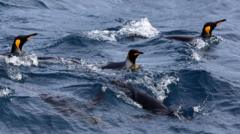Amid criticism and surprise from Australia, US officials assert that tariffs imposed on remote islands are necessary to combat international trade abuses, despite the islands' limited trade activity.
US Defends Controversial Tariffs on Uninhabited Islands

US Defends Controversial Tariffs on Uninhabited Islands
The US Commerce Secretary explains tariffs on Heard and McDonald islands intended to close loopholes in international shipping regulations.
The US Secretary of Commerce, Howard Lutnick, has recently defended the contentious decision to impose tariffs on the Heard and McDonald islands, a remote group of uninhabited territories known mainly for their populations of penguins and seals. According to Lutnick, the tariffs are designed to address "ridiculous loopholes" which could potentially allow other nations to use these islands as transshipment points to access the US market more easily.
The announcement took Australian authorities by surprise, with Trade Minister Don Farrell labeling the measure as a "clearly a mistake" and suggesting that it stemmed from a "rushed process." Still, Lutnick stood firm when questioned about the necessity of including these islands in the tariff regime, stating, "If you leave anything off the list, the countries that try to basically arbitrage America go through those countries to us. The President knows that, he's tired of it, and he's going to fix that."
His remarks were part of a broader defense by US government officials following a significant dip in the stock market. On one of the worst trading days since 2020, all three major US stock indices fell over 5%.
Trade experts point out that transshipment—shipping goods through one port to another—is a standard practice in global commerce but can also create vulnerabilities for illicit activities. The Pew Charitable Trusts has highlighted concerns around this practice, suggesting it enables potential manipulation or obfuscation of shipping data, allowing for the illegal movement of seafood products.
Export data suggests that trade volumes from the Heard and McDonald islands to the US are minimal. In 2022, the US imported roughly $1.4 million worth of goods from these territories, primarily categorized as "machinery and electrical" products with no further specifics provided.
Notably, the US tariffs also extend to the British Indian Ocean territory, which is primarily a military installation and requires a special permit for entry, having exported about $414,350 to the US last year. The unfolding situation highlights ongoing debates around trading strategies and clamping down on misuse of global shipping practices.
The announcement took Australian authorities by surprise, with Trade Minister Don Farrell labeling the measure as a "clearly a mistake" and suggesting that it stemmed from a "rushed process." Still, Lutnick stood firm when questioned about the necessity of including these islands in the tariff regime, stating, "If you leave anything off the list, the countries that try to basically arbitrage America go through those countries to us. The President knows that, he's tired of it, and he's going to fix that."
His remarks were part of a broader defense by US government officials following a significant dip in the stock market. On one of the worst trading days since 2020, all three major US stock indices fell over 5%.
Trade experts point out that transshipment—shipping goods through one port to another—is a standard practice in global commerce but can also create vulnerabilities for illicit activities. The Pew Charitable Trusts has highlighted concerns around this practice, suggesting it enables potential manipulation or obfuscation of shipping data, allowing for the illegal movement of seafood products.
Export data suggests that trade volumes from the Heard and McDonald islands to the US are minimal. In 2022, the US imported roughly $1.4 million worth of goods from these territories, primarily categorized as "machinery and electrical" products with no further specifics provided.
Notably, the US tariffs also extend to the British Indian Ocean territory, which is primarily a military installation and requires a special permit for entry, having exported about $414,350 to the US last year. The unfolding situation highlights ongoing debates around trading strategies and clamping down on misuse of global shipping practices.





















